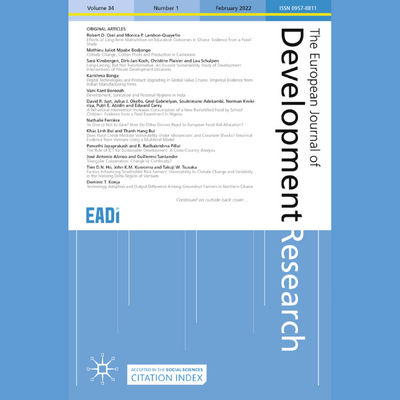Call for Papers: EJDR Special Issue: Race, (Anti-)Racism and Development
As Gloria Wekker points out, however, “the point of not knowing, racial ignorance, and white innocence has long passed.” #BlackLivesMatter protests have highlighted the continuation of racial injustice in the aid sector, raised questions about what this means for development studies and called for a direct engagement with these issues. Many gaps remain, however, in our understanding of how power and privilege function within ‘development’ and the embodied experience of racialisation. We remain confounded by the multiple ways in which racialised taxonomies of value and ways of knowing development function in the academy and society. Much of the discussion of racism in development studies and the sector continues to exclude questions of the epistemologies, materiality, relationality and globality of race. The appropriation of a ‘race lens’ in development scholarship and policy has facilitated backlash and depoliticised the agenda. There is an urgent need to gather critical reflections which call out these missteps and elucidate the many racialised spaces, histories, and practices of development.
This Special Issue on Race, (Anti-)Racism and Development aims to re-centre and reflect upon contemporary scholarship and new directions in thinking on race and development. Guest editors invite papers that critically examine racialised dynamics in and of development. Contributions may address, but need not be restricted to, any of the following guiding questions:
- How do racialised ways of knowing development shape what questions are deemed worthy to ask and what answers can be heard?
- What space is given or can be claimed for reflexivity, as an ethical necessity, to identify racialised ways of knowing in any and every development research or practical project?
- Where does anti-racist knowledge production sit within moves for epistemic plurality? What tensions might arise for the study and practice of development?
- Can racism embedded ‘in’ development be challenged without simultaneously exposing the racism ‘of’ development?
- How do we analyse racialised processes of extractivism, settler colonialism, accumulation by dispossession, and climate injustice which the development complex continues to extend and facilitate?
- How do we trace ‘racial capitalism’ as simultaneously embedded in particular social formations and operating at a global level and what other concepts might we use to address contemporary racialised imperialism?
- How is development addressed within contemporary abolitionist, reparationist and revolutionary anti-imperialist movements?
- How do race and racism shape everyday development practice and academic spaces?
- How does racialised power circulate throughout the aid architecture to reproduce inequality and injustice?
- In what ways might an intersectional approach extend beyond essentialist binaries and deepen understandings of variegated modes of domination within development spaces?
These questions/topics are not exclusive. We encourage scholars to submit any work that questions prevailing norms and critical scholarship and that details the intersections, contradictions, multiple experiences, and entry points that can unravel the racialised legacies, practices and conceptualisations of development.
Guest Editors
Jenna Marshall, King’s College London
Robtel Neajai Pailey, London School of Economics and Political Science
Kamna Patel, University College London
Althea Rivas, SOAS, University of London
Kalpana Wilson, Birkbeck, University of London
SI Abstract Submission Instructions
We are calling for extended article abstracts of 300-500 words by 11 April 2023. Please send the abstracts to raceanddevelopmentWG(at)gmail.com
Emails should include the subject heading EJDR RAD Special Issue Submission. Abstracts should include a title, brief bio of contributing authors (50 words maximum) and a list of five keywords. Abstracts can be submitted in either English or French.
In addition to the standard review processes of the EJDR, 10 to 12 submissions will be selected and invited for an internal peer-review workshop in September 2023 facilitated by the SI guest editors. We will also extend invitations to scholars who participated in the Race and Development Roundtable Series at the 2021 Development Studies Association (DSA) conference to produce important contributions based on their roundtable sessions.
SI Key Dates
- 11 April 2023: Extended abstracts due
- 25 April 2023: Notification of acceptance
- 01 September 2023: Contributors and guest editors peer review workshop. Full manuscripts due for internal peer-to-peer review 10 days before the workshop
- 01 October 2023: Full manuscripts due to EJDR
- August/September 2024: Special Issue publication
EJDR SI Article Format Instructions:
Full articles should be no longer than 9000 words all-inclusive in their final version (including title, abstract, acknowledgement, notes, references and any appendices including tables and figures). Authors should bear in mind that this limit also applies to papers accepted for publication. We thus highly recommend that some scope is left for possible revision following the refereeing process. Submissions over this limit will be sent back to authors for shortening, and any lengthy appendixes will be published online-only.
The article should begin with an indented and italicised abstract of maximum 150 words, which should describe the main arguments and conclusions of the article.
In addition to the abstract, upon submission authors are asked to provide between five and eight keywords.
Further information on the EJDR Submission Guidelines for Authors can be found here: http://www.palgrave.com/gp/journal/41287/authors/submission
Language Policy:
EJDR accepts articles in both French and English. For accepted manuscripts, EJDR will automatically translate the abstract into either French or English (we encourage bilingual authors to provide the abstract in both languages, thereby ensuring all nuances are preserved).
Early Career Researchers:
We encourage submissions by Early Career Researchers. Early career researchers may not always be familiar with abstract and article writing and submission processes. To support the preparation of your submission, we invite you to familiarise yourself with EJDR’s early careers tutorial, available at EJDR Early Career Initiative - YouTube


